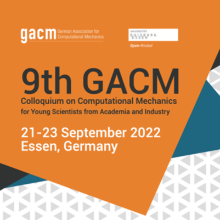From 21 to 23 September 2022, this year’s GACM Colloquium on Computational Mechanics for Young Scientists from Academia and Industry will take place in Essen, Germany. Besides a plenary lecture by SimTech PR Marc-André Keip, the SimTech PhD researchers Anika Strauß (Institute for Structural Mechanics), Jonas Kneifl (Institute of Engineering and Computational Mechanics) and Julian Lißner (Institute of Applied Mechanics, MIB) will organize and host a minisymposium on Friday, 23 September 2022 at 9 am.
"Organizing such a mini-symposium not only contributes to the visibility of our project network, but is also a great networking opportunity for us", the three PhD researchers unanimously explain.
The minisymposium, MS 05, will deal with “Data-integrated modeling and simulation”. Beyond theory, experiment, and simulation, data integration is about to establish itself as the fourth pillar of science. Integrating data into simulation has the potential to replace traditional modeling approaches, for instance, in situations that require some sort of pattern recognition. But data-integration can also be used to enhance or accelerate classical modeling and simulation methods. Data availability is continuously increasing, establishing the further development of data-based methods as an emerging field. Data can emanate from experiments in this context, but it may also be simulation data. Reversely, purely data-driven approaches, like machine learning methods based on artificial neural networks, can be improved by merging them with classical elements of modeling, for instance, by implementing basic principles, such as energy conservation.
Also involved in this session are SimTech’s principal investigator Manfred Bischoff, Head of the Institute for Structural Mechanics and Vice Rector for Research and Early Career Researchers, as well as SimTech PR Jörg Fehr from the Institute of Engineering and Computational Mechanics.
The GACM Colloquium is a biennial conference that brings together young researchers in the field of computational mechanics. The event provides excellent opportunities for students and postdocs to present their work, acquire new knowledge in the field of numerical modeling in engineering and science, and to establish a network of colleagues and peers. The colloquium consists of mini-symposia — organized by selected young scientists — as well as a poster session and several plenary lectures. This year, it is jointly hosted by the Institute of Structural Analysis of Plates and Shells and the Institute of Mechanics at the University of Duisburg-Essen.


